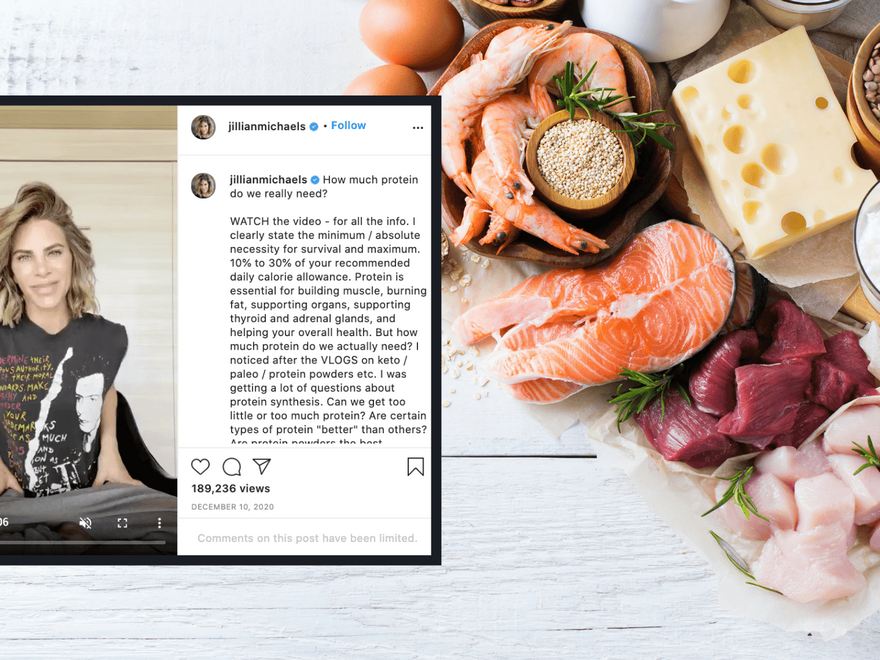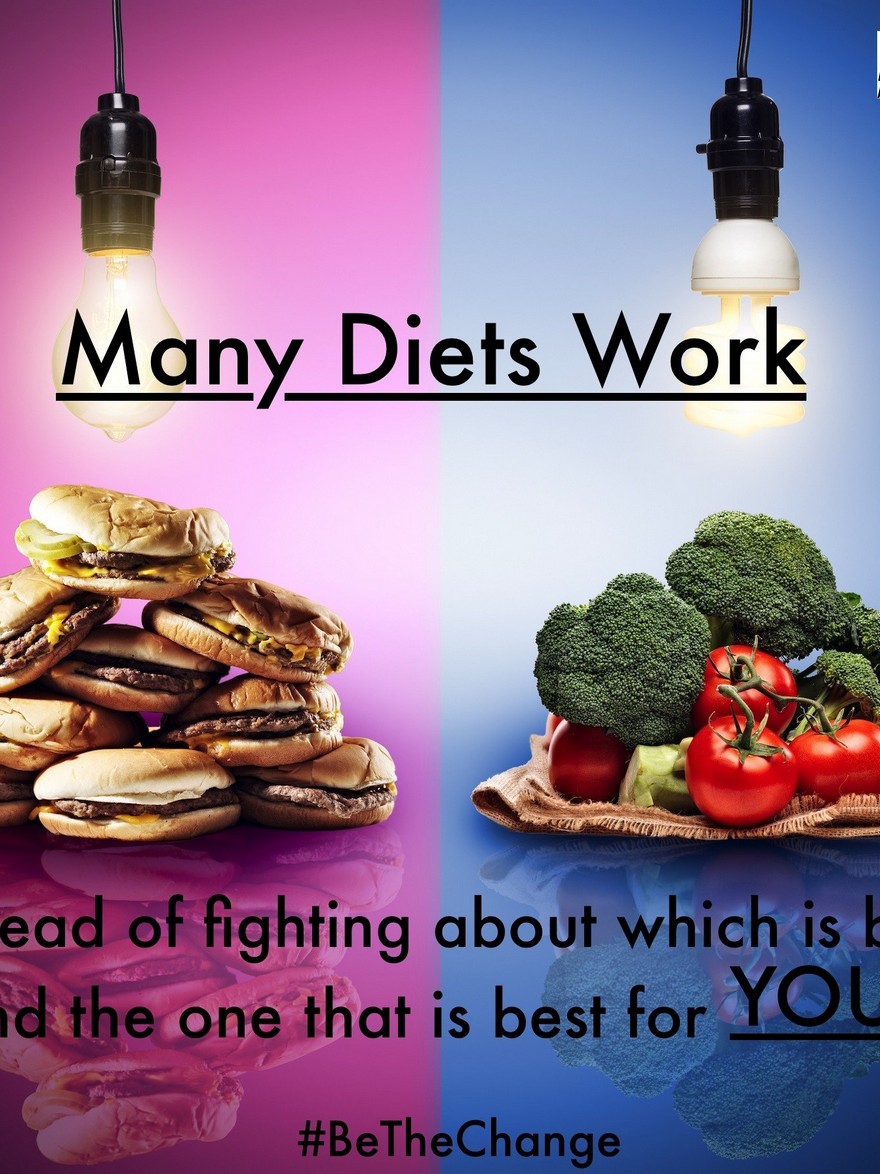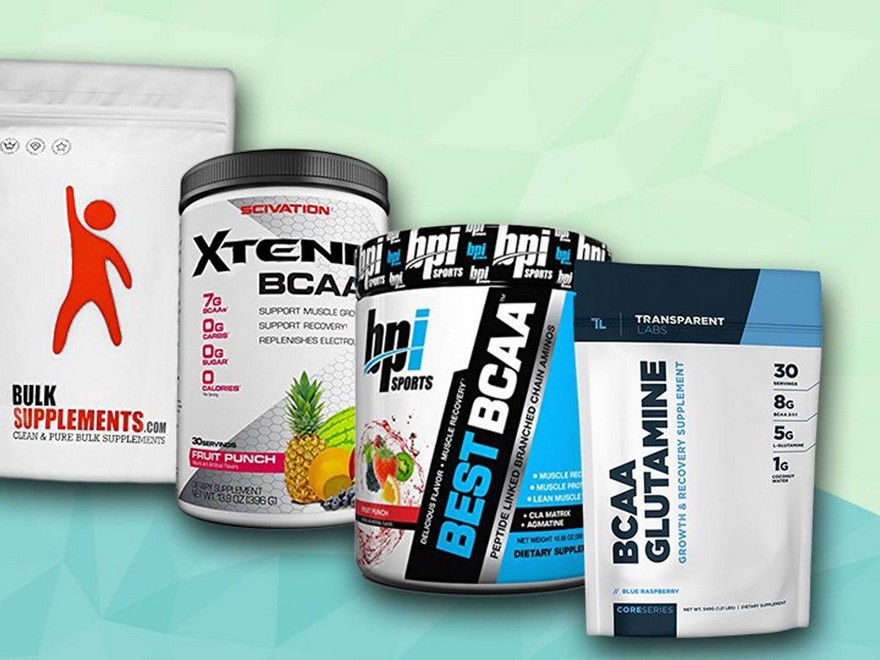PLEASE STOP: Jillian Michaels

I’m not a fan of calling out individuals for various opinions. In spite of everything, many issues work in health and diet, and limitless ideas and theories are nonetheless being explored. So, for private well being, on some stage, if it really works in your well being, then it really works for you.
However, sharing private expertise and suggestions is far totally different than posing opinions or beliefs as if they’re plain scientific information. You must draw the road at manipulating analysis or simply straight-up mendacity as a result of your well being is simply too essential.
That’s what occurred when Tracy Anderson twisted the advantages (and risks) of power coaching, and it’s taking place increasingly more at a daunting tempo. Too many “consultants” simply make up info, current them as information, and the result’s you might be extra confused than ever. It’s not OK, so let’s cleanse you of the ridiculousness and provide a style of actuality.
In a current Instagram submit, Jillian Michaels (of The Largest Loser fame) shared the “risks” of consuming greater than 30% of your day by day energy from protein. “Risks” are in quotes for an excellent purpose.

She claims a higher-protein weight loss plan will trigger the next: bone loss, kidney stones, liver stress, pancreatic most cancers, colorectal most cancers, coronary heart illness, and early growing old.
Her scientific proof for these claims? As she acknowledged within the video, “Belief me, I might offer you a bunch of various research, it could take all day. You don’t need greater than 30 % protein. It’s not an excellent factor.”
Nicely, then. Sadly, she made very definitive claims, a lot of that are merely not supported by science.
When questioned on her IG posts, she adopted up by saying one thing alongside the strains of, “However, Dr. Sinclair says this!” (Dr. Sinclair is a Harvard researcher who research growing old).
With thousands and thousands of followers, that is the equal of dietary negligence. Your followers probably haven’t learn Dr. Sinclair’s work. And, a lot of his claims weren’t mirrored by you with the nuance and element wanted. In case you’re going to share different’s work, you possibly can’t cherry-pick information.
Revered researcher Dr. Brad Schoenfeld might need put it greatest in his response to the submit, “Just about each sentence is an over-extrapolation of proof or an outright falsehood.”
 Let’s get one factor clear earlier than we dive in: should you’re consuming 30 % (or much less) of your energy from protein, it is likely to be an excellent quantity for you. There’s nothing flawed with setting that as your aim. The truth is, it’s an quantity I’ve consumed for my weight loss plan or beneficial for purchasers.
Let’s get one factor clear earlier than we dive in: should you’re consuming 30 % (or much less) of your energy from protein, it is likely to be an excellent quantity for you. There’s nothing flawed with setting that as your aim. The truth is, it’s an quantity I’ve consumed for my weight loss plan or beneficial for purchasers.
The issue isn’t the recommendation (“Eat 30 % protein or much less.”) — it’s the rationale and manipulation of proof (“Protein kills your kidneys!”), which is designed to create worry, slightly than educate.
You recognize the quote, “Give a person a fish, and also you feed him for a day. Train a person to fish, and also you feed him for a lifetime.”
What occurs should you make individuals worry consuming an excessive amount of fish?
As you’ll be taught in a second, it may be a giant drawback, which is why one thing needed to be mentioned.
Jillian makes absolute claims about what occurs while you eat greater ranges of protein that aren’t correct. Consuming an excessive amount of protein would possibly probably have some downsides. However, should you’re going to assist individuals out, it’s essential embody the important particulars.
It’s so much to untangle, however right here’s what it’s essential know, which particulars had been extraordinarily misguided, and the place you would possibly must assume twice about your protein consumption.
Reality: Protein Is Important
Let’s not get it twisted: Your physique wants protein. Finish of story. Jillian was proper on this. She mentioned it’s a necessity, and it’s. Protein is the constructing block of all of the cells in your physique. From constructing muscle and serving to with mobile processes to bettering your hair, pores and skin, and nails, it’s an extremely precious nutrient.
Fiction: There’s Purpose to Concern Protein
I lined the origins (and flaws) of protein worry again on this weblog submit from 2015.
Prior to now, loopy headlines have included “Excessive protein is as dangerous as smoking.” It brought on me to write down a rebuttal about how protein shouldn’t be a demise sentence. In spite of everything, should you’re going to critique protein, it’s essential settle for all of its normal well being advantages:
“The adversarial potential of not getting sufficient protein (sarcopenia, compromised glucose management, decrease immunity, brittle bones), particularly within the growing old inhabitants, far outweighs the dangers of getting an excessive amount of.“
Your physique is complicated. Creating worry round a singular macronutrient causes dominos to fall into a number of instructions, and they may not all be in your greatest curiosity.
It’s good to contemplate 3 primary elements:
1. What proteins are you consuming?
It’s one factor to scale back the full quantity of protein. However, what proteins had been you consuming within the first place? Processed meats or wild fish?
2. In case you resolve to eat much less protein, what are you changing it with?
Equally, should you cut back protein — what are you changing it with? In case you’re going to strike worry in protein, it’s greatest to present route about options.
3. Are you even consuming an excessive amount of protein within the first place?
And, possibly most significantly, the vast majority of individuals are nowhere near consuming greater than 30% of their energy from protein. In response to Harvard, about 16 % of the typical American weight loss plan comes from protein.
Most individuals additionally don’t rely energy. So, on a sensible stage, should you hear, “Don’t eat protein,” the pure response is to eat much less, even when the quantity you’re consuming doesn’t current any hazard.
It’s why presenting protein as harmful, particularly with out particulars, may cause bother.
Talking on risks…
Fiction: Excessive-Protein Diets Hurt Wholesome Kidneys (They DON’T)
Jillian claims greater protein results in kidney issues and early demise. That is an outright false assertion, and the analysis is (thus far) very definitive on the matter.
This meta-analysis from 2018 discovered that higher-protein diets don’t hurt wholesome kidneys. This has been confirmed over…and over…and over…and over once more.

You probably have kidney illness, then you need to seek the advice of along with your physician. In any other case, there’s no purpose to worry.
Fiction: Protein Causes Bone Loss. (It doesn’t, however there’s one thing it’s essential know)
What about Jillian’s claims about protein and bone loss? We all know that calcium is essential to bone well being. And, because it seems, so is protein. The truth is, there was a examine from 2019 titled, “Optimizing Dietary Protein for Lifelong Bone Well being.” Right here’s a takeaway you would possibly discover fascinating:
Along with calcium within the presence of sufficient vitamin D, dietary protein is a key nutrient for bone well being throughout the lifespan and due to this fact has a perform within the prevention of osteoporosis. Protein makes up roughly 50% of the quantity of bone and about one-third of its mass. The bone protein matrix undergoes steady turnover and transforming; due to this fact, an sufficient provide of amino acid and mineral substrate is required to assist the formation and upkeep of bone throughout the lifespan.
OK, so we all know protein is essential, however what about an excessive amount of protein? It’s true that protein can improve protein excretion — but it surely doesn’t result in bone loss. It’s because protein additionally will increase calcium absorption.
Some would possibly level to the acidity of meats breaking down your bones…however that’s additionally been proven to be inaccurate.
For almost all of individuals consuming typical western diets with acid a great deal of ≤1 mmol/kg, whose renal perform and acid-excretory means are regular, dietary acid hundreds wouldn’t be a readily detectable consider altering bone mineral density resulting in the event of osteoporosis. Different elements similar to age, gender, race, and immobility are quantitatively extra main elements in figuring out bone mass and bone breakdown.
So far, there isn’t robust assist that prime protein diets result in bone loss, and the shortage of connection is backed up by main organizations that concentrate on your bones.
The IOF and European Society for Medical and Economical Facets of Osteoporosis, Osteoarthritis and Musculoskeletal Ailments now advise that dietary protein ranges above the present RDA in america and Canada, whatever the supply, could also be useful in decreasing bone loss and hip fracture danger, offered calcium intakes are sufficient.
The important thing to bone well being isn’t how a lot protein you eat, however — slightly — ensuring you have got sufficient calcium.
The Newest on Protein and Most cancers (Connection However Not Clear Causation)
Subsequent up: most cancers. I don’t mess with most cancers. My father is battling stage 4 proper now, my older brother has battled most cancers twice, pancreatic most cancers took my grandfather. To place it merely: most cancers has ravaged each side of my household, so danger elements and causes are of private curiosity.
The connection between protein and most cancers appears to be — on some stage — linked to the kind of most cancers. With reference to pancreatic most cancers, analysis means that higher-protein diets don’t result in better danger. The identical might be mentioned about greater protein and colorectal most cancers.

With breast most cancers, analysis means that sure meals would possibly improve danger, relying on how a lot you eat and supply. From a 2017 meta-analysis:
There was a null affiliation between poultry, fish, egg, nuts, whole milk, and complete milk consumption and breast most cancers danger. Larger whole crimson meat, recent crimson meat, and processed meat consumption could also be danger elements for breast most cancers, whereas greater soy meals and skim milk consumption could cut back the danger of breast most cancers.
Once more, the query right here is concerning the amount of protein consumption. And, the conclusive proof that consuming greater than 30 % of your weight loss plan causes most cancers simply doesn’t exist.
The truth is, a 2020 meta-analysis of greater than 30 research appeared on the relationship between whole protein, animal protein, plant protein, and most cancers. Their conclusion:
Larger consumption of whole protein was related to a decrease danger of all trigger mortality, and consumption of plant protein was related to a decrease danger of all trigger and heart problems mortality. Alternative of meals excessive in animal protein with plant protein sources may very well be related to longevity.
Now, some analysis — largely in rodents — has assessed the affect of sure amino acids (similar to BCAAs and methionine) and the affect on a wide range of organic elements which may affect growing old (and as a byproduct) most cancers. These embody issues like mTORC1, Mnmt, SAM metabolism, fibroblast progress elements, and oxidative stress and irritation.
These are all fascinating areas of analysis for anti-aging and most cancers, however the analysis is pretty early (and largely in animal fashions) to have the ability to make any conclusive claims on the danger of whole protein, no matter life-style behaviors and dietary selections. As time goes on, we should always definitely be taught far more about what’s an actual danger issue (and what’s not).
(Observe: You probably have most cancers, many docs would possibly recommend that you just alter your weight loss plan and protein consumption. What causes most cancers and the way you battle most cancers are two totally different concerns and shouldn’t be confused.)
The Sophisticated Relationship Between Protein and Coronary heart Illness
Lastly, Michaels claims a powerful hyperlink between extra protein and coronary heart illness. This one is hard as a result of should you’re measuring coronary heart illness, it’s essential management for life-style elements and may’t simply take a look at protein in a vacuum. That’s as a result of we all know life-style elements — similar to smoking, hypertension, stress, body weight, and so on. — all are the primary triggers for coronary heart points.
That’s to not say protein is totally off the hook. There may be some analysis that sure meals would possibly create a “marginal improve in danger” for coronary heart points, depending on the supply of protein and a wide range of different elements. However, the analysis is combined.
In case you management for life-style elements (like smoking), as they did on this examine of 80,000 girls over 25 years, they discovered that protein consumption had an inverse relationship with coronary heart illness. From their conclusion: our findings recommend that changing carbohydrates with protein could also be related to a decrease danger of ischemic coronary heart illness.
Very like most cancers, the analysis isn’t conclusive on the affect of whole protein, though protein supply and energy might have an effect. To cite Dr. Schoenfeld:
“The researchers are lumping ‘animal protein’ into a whole group, but it surely very properly may very well be different elements of the weight loss plan which can be having the affect aside from protein. Have been the meats processed? If that’s the case, may very well be one thing within the processing. How had been the meats cooked? Might be attributable to carcinogens from overcooking the meats. What was the fats content material and breakdown of the fats profiles (i.e. saturated, MUFA, PUFA)? This may very well be a difficulty. What about whole caloric consumption? There are such a lot of potential confounding points that it makes drawing any conclusions extraordinarily tough. Merely information from observations might be very deceptive.”
Your Takeaways: Tips on how to Eat Protein and Be Wholesome
What do you have to make of all of it? For starters, Jillian Michaels must pump the breaks on absolute statements which can be completely not conclusive, and — in some circumstances — fully false.
There are lots of issues she might have mentioned that wouldn’t increase any crimson flags, similar to recommending not more than 30% protein as a result of she feels that’s sufficient for most individuals’s targets and wishes. That will be stable recommendation and innocent. As a substitute, she tried to rationalize her personal beliefs with lies and twisted science that does a variety of injury and creates an amazing quantity of confusion.
In case you can keep away from absolutely the worry, the controversy about protein can offer you some precious pointers in your personal life. Inside the final 5 years, my very own strategy to protein has shifted based mostly on analysis and my conversations with my docs.
Listed here are a number of elements that may make it easier to decide how you can match protein into your weight loss plan:
- The worry of higher-protein diets is considerably overblown. Protein is essential and has many advantages that stretch from the way you look (fats loss and muscle acquire) to how properly you age. For metabolic elements and satiety, it’s useful to incorporate, no less than, some protein in meals and snacks.
- Usually, a moderate-to-high protein weight loss plan is sweet for physique composition, and decrease physique fats.
- The protein supply is a giant consideration. There’s a giant distinction between consuming wild-caught salmon and processed or over-cooked meats.
- When including protein to your weight loss plan, if you wish to comply with the present science, prioritize the next: fish, eggs, dairy (together with whey or casein protein powders), nuts, legumes, and poultry. They have a tendency to — for probably the most half — not be seen as danger elements for illness.
- Crimson meat shouldn’t be off-limits, however probably the most “heart-healthy” weight loss plan (the Mediterranean Food regimen) limits general crimson meat. A normal rule of thumb is consuming crimson meat 1-2 instances per week or a number of instances monthly. [Note: some people handle red meat great and others don’t. If you really want to dig in, get blood work done and discuss with your doctor.]
- You probably have issues, see your physician, get blood panels, and assess what’s taking place inside your personal physique. This would be the greatest indicator of any potential dangers and changes it’s essential make.
 Adam Bornstein
Adam Bornstein
Adam Bornstein is a New York Occasions bestselling creator and, in response to The Huffington Submit, “some of the inspiring sources in all of well being and health.” An award-winning author and editor, Bornstein was the Health and Diet editor for Males’s Well being, Editorial Director at LIVESTRONG.com, and a columnist for SHAPE, Males’s Health, and Muscle & Health. He’s additionally a diet and health advisor for LeBron James, Cindy Crawford, Lindsey Vonn, and Arnold Schwarzenegger. His work has been featured in dozens of publications, together with The New York Occasions, Quick Firm, ESPN, and GQ, and he’s appeared on Good Morning America, The At present Present, E! Information, and The Cheddar.
- The Rabbit Gap: How A lot Protein Per Meal?
- Coaching to Failure: 5 Questions You Have to Reply
- The Completely different Types of Whey Protein And What’s Finest For You
Set your Writer Customized HTML Tab Content material in your Profile web page




